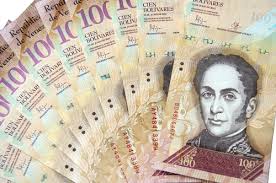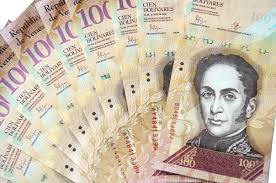
While replacing with a stack of bolivar notes handed over by his customer for slices of salty white cheese, Humberto Gonzalez weighs the bills instead of counting them. Gonzalez owns a a delicatessen counter in eastern Caracas and he weighs the Bolivian currency because it is so devalued and each purchase requires so many bills that weighing them is easier than counting them.
“It’s sad. At this point, I think the cheese is worth more,” Gonzalez says.
In a country that refuses to publish consumer-price data on a regular basis, it’s also one of the clearest signs yet that hyperinflation could be taking hold. Post-World War I Germany, Yugoslavia in the 1990s and Zimbabwe a decade ago are the examples of the past century’s most-chaotic hyperinflation episodes and even though cash-weighing isn’t seen everywhere but is increasing and echoing the most-chaotic hyperinflation instances.
“When they start weighing cash, it’s a sign of runaway inflation. But Venezuelans don’t know just how bad it is because the government refuses to publish figures,” said Jesus Casique, financial director of Capital Market Finance, a consulting firm.
The bolivar has been reduced to a nuisance even though it was once one of the world’s strongest currencies. Hundreds of bills are required for basic purchases. Shopkeepers stash thousands in boxes and overflowing drawers and shoppers shove piles of them into gym bags before venturing into crime-plagued streets. Economists are left to guess what the inflation rate is, in the absence of official data. For this year, inflation estimates range from 200 percent to 1,500 percent.
The government declined to print bigger-denomination bills as the bolivar sank until now. Worth less than a dime is the 100-bolivar note -- the nation’s largest.
According to someone with direct knowledge of the order, five currency companies were quietly asked to submit bids for bigger bills -- 500, 1000, 5000, 10,000 , and perhaps a 20,000-bolivar note, a few weeks ago.
In time for Christmas bonuses, the request is for the bills to be ready. While so far no tender has been awarded and normally such an order takes four to six months. The person said that plans to only swapping the color, not the design, of existing bills, and adding zeros of the existing notes is being made by the government to minimize time and cost. The Central Bank said it had no comment.
Re-denominating banknotes is “raising the white flag. No one wants to do it, but eventually their hand gets forced”, said Steve Hanke, an economist at Johns Hopkins University.
A kind of paradox: they are awash in cash but can rarely afford to buy anything, is one that many Venezuelans live for now.
In truth, it has become an ordeal to even get hold of enough legal tender. Weary consumers face long waits at the bank where dwindling numbers of cash machines have strict limits before embarking on their shopping odysseys.
The number of bank machines has been declining despite the increased need for them, data from the Central Bank shows. Now a typical ATM is restocked every few hours whereas about only two years ago such an ATM was restocked every few days. According to Casique, in addition to this problem, some 40 percent of the population have no bank accounts and many small towns have no machines at all.
(Source:www.bloomberg.com)
“It’s sad. At this point, I think the cheese is worth more,” Gonzalez says.
In a country that refuses to publish consumer-price data on a regular basis, it’s also one of the clearest signs yet that hyperinflation could be taking hold. Post-World War I Germany, Yugoslavia in the 1990s and Zimbabwe a decade ago are the examples of the past century’s most-chaotic hyperinflation episodes and even though cash-weighing isn’t seen everywhere but is increasing and echoing the most-chaotic hyperinflation instances.
“When they start weighing cash, it’s a sign of runaway inflation. But Venezuelans don’t know just how bad it is because the government refuses to publish figures,” said Jesus Casique, financial director of Capital Market Finance, a consulting firm.
The bolivar has been reduced to a nuisance even though it was once one of the world’s strongest currencies. Hundreds of bills are required for basic purchases. Shopkeepers stash thousands in boxes and overflowing drawers and shoppers shove piles of them into gym bags before venturing into crime-plagued streets. Economists are left to guess what the inflation rate is, in the absence of official data. For this year, inflation estimates range from 200 percent to 1,500 percent.
The government declined to print bigger-denomination bills as the bolivar sank until now. Worth less than a dime is the 100-bolivar note -- the nation’s largest.
According to someone with direct knowledge of the order, five currency companies were quietly asked to submit bids for bigger bills -- 500, 1000, 5000, 10,000 , and perhaps a 20,000-bolivar note, a few weeks ago.
In time for Christmas bonuses, the request is for the bills to be ready. While so far no tender has been awarded and normally such an order takes four to six months. The person said that plans to only swapping the color, not the design, of existing bills, and adding zeros of the existing notes is being made by the government to minimize time and cost. The Central Bank said it had no comment.
Re-denominating banknotes is “raising the white flag. No one wants to do it, but eventually their hand gets forced”, said Steve Hanke, an economist at Johns Hopkins University.
A kind of paradox: they are awash in cash but can rarely afford to buy anything, is one that many Venezuelans live for now.
In truth, it has become an ordeal to even get hold of enough legal tender. Weary consumers face long waits at the bank where dwindling numbers of cash machines have strict limits before embarking on their shopping odysseys.
The number of bank machines has been declining despite the increased need for them, data from the Central Bank shows. Now a typical ATM is restocked every few hours whereas about only two years ago such an ATM was restocked every few days. According to Casique, in addition to this problem, some 40 percent of the population have no bank accounts and many small towns have no machines at all.
(Source:www.bloomberg.com)





